In the last few years, we have seen loads of exciting developments in AI. New tools are popping up left and right, helping with a wide range of tasks. AI is finding its place in every market, from writing to keyword research to fact-checking. The rise of this phenomenon is undeniable. Let’s explore a few AI tools that can support your SEO efforts.
We’ve listed 12 tools that can help you with your SEO in different ways. That said, it’s important to maintain a healthy balance between AI support and human input. AI can help us greatly, especially with getting started and saving time on easy tasks. Authenticity and trustworthiness still matter, both for your audience and SEO.
Don’t let AI take over entirely or erase your unique perspective.. Don’t underestimate your importance in this process and always stay critical of the output. Check the tone of voice and the facts, and rewrite anything that feels off. In the end, this human element will get you to the top of the search results.
1. ChatGPT (Plus)
Let’s start with a tool you’ve probably heard of: ChatGPT. This is a text-based AI model that interacts with you in a conversational way to answer any question you have. Or fulfill any content request you have. This means ChatGPT can assist with a broad range of tasks.
Another great feature is the ability to tweak your request as you go. So if you ask ChatGPT to write an introduction for a blog post on a specific topic and the answer it comes up with is too long, you can then ask it to shorten it and it will do so. If you’re not happy with the tone of voice, you can ask it to change that. Or if you don’t like it at all, you can ask ChatGPT to rewrite it altogether. You can also craft more specific prompts to get better results from the start. This allows you to keep tweaking the text until you’re satisfied with it.
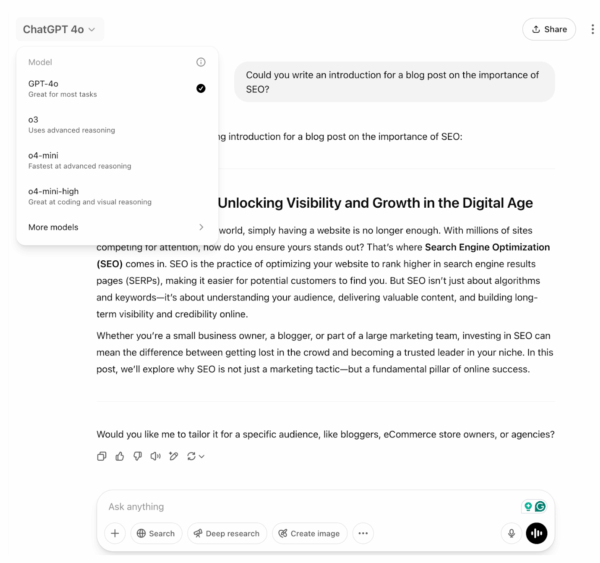
If you use ChatGPT plus, which is the paid version, you can also use the dropdown at the top left corner to select a model fitted to your needs. As you can see, these other models give you more options. But the free version of ChatGPT can still handle most basic content requests.
2. Yoast SEO & WooCommerce SEO
Yoast SEO comes with several AI features. The most recent one is Yoast AI Optimize, which helps you improve your content based on the feedback you get—inline, where you are working. Yoast AI Optimize highlights suggested changes for certain assessments in the Yoast SEO Analysis, allowing you to easily apply or dismiss them. This ensures that the final decision always remains in your hands.

The second AI feature generates SEO titles, meta descriptions, and social snippets for you. It looks at the content already there and gives you a few options with the click of a button. This saves you the hassle of doing it manually and provides you with relevant titles, meta descriptions, and social snippets to increase your click-through rates.
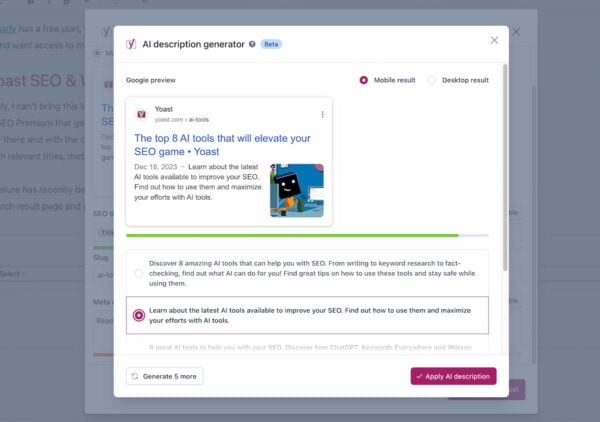
The AI features are part of our paid plugin, Yoast SEO Premium. This comes with a yearly subscription plan, but an affordable one. We want to make our features available to as many people as possible.
Unlock AI features in Yoast SEO Premium
Get this feature and much more for your WordPress site with the Yoast SEO Premium plugin!
We’ve also added this feature to Yoast WooCommerce SEO a short while back. This helps you make your products stand out on the search result page and get those clicks to your website. So if you have an online shop and are looking to optimize your product pages, it’s worth taking a look at that product as well.
3. Jasper
Another tool you can use to produce content is Jasper. But it is more focused on producing marketing content like blog posts, social posts, email and website copy. Where ChatGPT targets a wider audience, Jasper focuses on people working in marketing and entrepreneurs who do their marketing themselves. Utilizing the AI tool works pretty similarly, where you put in a request and Jasper provides you with content specifically created for a newsletter or post (or something else).
It also allows you to upload a style guide or examples of your content so that it can learn your preferred tone of voice. In addition, you can also give it information about your company like the products or services you provide, your audience and even a campaign brief. Jasper uses all of this to understand the goal of the content you’re requesting and to create content that is on-brand and detailed. What’s cool about this tool is that it also comes in the form of a browser extension. Allowing you to use it while you’re working on your content in WordPress, Gmail and other places.
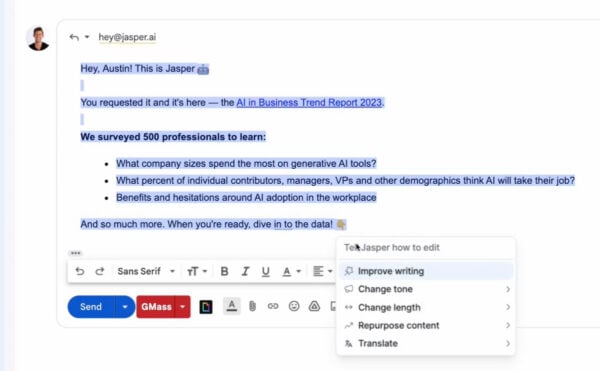
It’s good to know that Jasper works with a monthly (or yearly) subscription plan, so this is a paid tool. They have a few options you can check out and a free trial if you want to give it a try before subscribing.
4. Keyword Insights
A vital but time-consuming part of SEO is keyword research. That’s why one of the AI tools we’ve picked is focused on that specifically. You can use Keyword Insights to find new keyword ideas and cluster them. By filling in a keyword it gives you loads of related keywords and their search volumes. Keyword Insights also helps you categorize keywords by clustering them properly and it allows you to upload other files to get those keywords in there as well. It gives you a nice overview of all your keywords per cluster and all the relevant data to figure out which ones you want to work on. The tool actually uses an algorithm to quickly show you which keyword is the best choice at the moment.
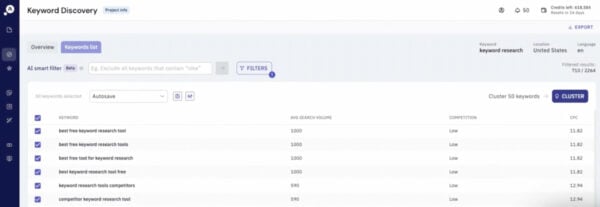
After you’re done with that, you can actually use the writing assistant to get started with writing. What’s cool about this writing feature is that it gives you an overview of the top headings of other websites that rank high on that keyword. Or it can even generate an outline for you. Which can be great inspiration to get started with the structure of your text. It also helps you write the text by suggesting relevant content for the article you’re working on.
Keyword Insights is a paid tool, that has several pricing options depending on your needs. A few of those options also enable team sharing, which comes in handy when you have multiple people working on your SEO. It has loads of interesting features to do keyword research in an organized way. But a very important sidenote is that it can be tempting to let the tool also do all the writing for you. Which might result in content that is far from original and authentic and will not get you that top result in Google. As it will be mainly based on what’s already out there. So make sure to check out the keyword features, but be mindful of how you use the writing assistant.
5. Semrush SEO Writing Assistant
Another writing tool powered by AI is the SEO Writing Assistant you can find in Semrush. This tool analyzes your text in terms of SEO, readability, originality and tone of voice. It gives you suggestions based on this analysis and also comes with a few features to optimize your text, such as the Rephraser, Compose and Ask AI. What’s great about the Originality section is that this helps you create content that’s not like everyone else’s, something you risk when using AI in your content creation. This can help you figure out whether you need to change your angle and it also checks your content for plagiarism.
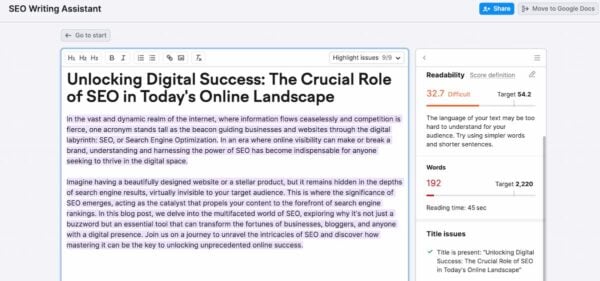
Another reason we’re mentioning this tool is because Semrush in general is a great tool for SEO. So having this option in there is a great addition to their set of tools. The SEO Writing Assistant is part of Semrush’s Content Marketing Platform, which is included with two of their three subscription plans. You can also sign up for a free trial to give it a whirl.
6. MarketMuse
When looking at AI tools that can help you elevate your SEO, MarketMuse is another one we want to mention. In short, MarketMuse is content planning and optimization software that comes with loads of SEO and automization features. The idea is that it puts everything you need in one place and automates content audits for you. Helping suggest what to work on next instead of guessing or speculating what does or doesn’t work.

It can help you do keyword research, plan your content and write. All based on personalized data, as they analyze your website and also look at competitors in your field. Which can save you loads of time and help you make informed decisions. Without having to switch between different tools and documents or sheets. It’s all in one place. As most AI tools discussed so far, MarketMuse works with a monthly subscription plan and gives you a few options to choose from.
7. Originality.ai
The name might already be an indicator of what this AI tool can do for you. Originality.ai helps you fact-check your text and also checks it for plagiarism. Being trustworthy is an important factor in SEO right now, and will probably remain important, so you need to get your facts straight. And make sure you’re not accidentally committing plagiarism, a growing risk in today’s AI-heavy landscapes.. Funnily enough, it also comes with an AI Content Detector which is pretty good in detecting content written by AI. Even if it has been paraphrased.
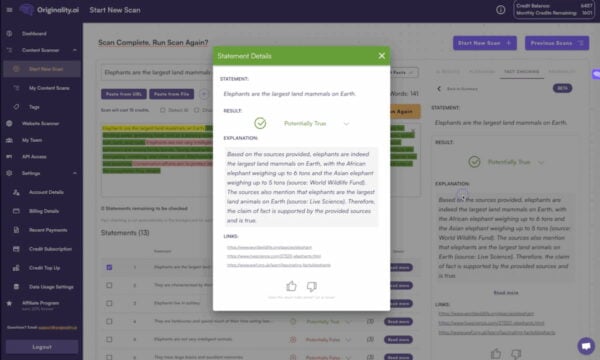
Originality.ai comes with a monthly subscription option and a pay-as-you-go option which gives you a bunch of credits to get started. Unfortunately, there is no free trial, but if you go to their website you can find loads of information (and some examples) of how the features work. There’s also a demo of their fact checker if you want to give that a try!
8. Grammarly
Grammarly is a tool that’s quite popular with the writers here at Yoast. It shows you when you’ve made an error when it comes to spelling and grammar, and works on different platforms and in different places. Which is very helpful when you write a lot of online text. Now that Grammarly also comes with the power of AI, it can do even more for anyone who writes online content.
Grammarly now comes with a generative text feature, which allows you to give it a prompt and get a draft right away. It also includes a rewrite feature to adjust the tone of your content. You can also teach it what your personal tone of voice is, so that it can give you specific suggestions that fit your communication style. Lastly, it can help you with brainstorming and outlines by giving suggestions based on your task at hand. It’s a neat little AI tool that you can use on the go.
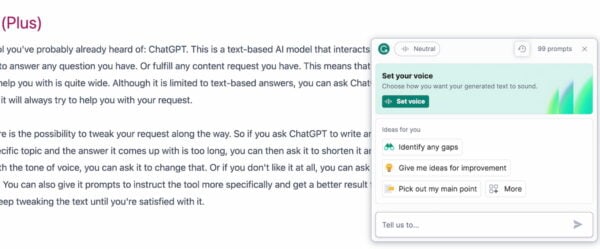
Grammarly has a free plan, which gives you access to their basic AI assistance and 100 AI prompts per month. They have a few paid monthly subscription plans if you need more and want access to more prompts and advanced features.
9. Gemini
Gemini is Google’s generative AI chatbot. It’s designed to handle a wide range of tasks including text generation, image analysis, coding, and data processing. Integrated into tools like Google Docs and Gmail, Gemini provides users with loads of options to improve their content on the spot. It also integrates with Google’s AI Studio for prototyping and testing.
Gemini is designed to serve both casual users and developers. Through the Gemini web app (formerly Bard), users can interact conversationally with the model, ask complex questions, or get help writing code and documents. This app also offers Gems, premade or custom prompts that can be saved for future use and help you with specific needs.
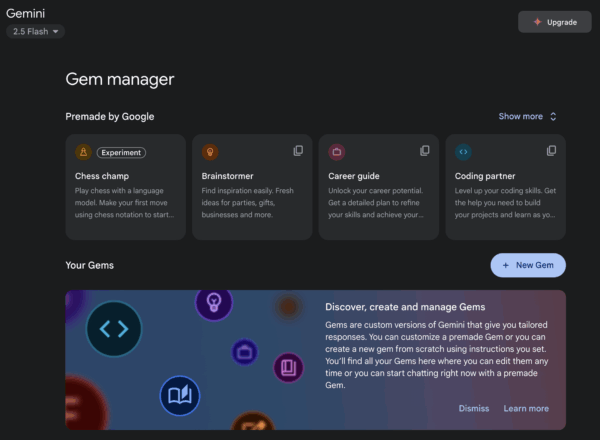
Gemini offers a free and paid subscription. The free version of the Gemini web app gives users access to Gemini Flash, a fast and cost-efficient model suitable for everyday tasks. For more advanced capabilities, Google offers Google AI Pro, which provides access to Gemini Pro, integrations in Google apps, and a few other more specific features.
10. Perplexity
Perplexity AI is a free AI-powered search and answer tool. It presents direct answers backed by real-time web sources, making it especially useful for research, current events, and factual information. It uses a conversational interface similar to a chatbot, allowing users to ask follow-up questions and refine their search naturally.
One of Perplexity’s standout features is its focus on citations and transparency. Each answer is accompanied by linked sources, allowing users to verify information or explore the topic further. This makes it a valuable tool for professionals, students, and writers who need trustworthy results quickly. The platform also includes features like “Research,” allowing deep research on any topic.

Perplexity offers a free option that provides access to fast and accurate answers using its standard models, along with web-sourced citations. For users who need more powerful tools, Perplexity offers different plans depending on your needs. Pro is aimed at individuals looking to use a more powerful and up-to-date version of the tool. Sonar API gives developers API access for any custom applications or automations they might want. Finally, Enterprise Pro is the choice recommended for organizations looking to use this tool within the team.
11. Claude
Claude is a conversational AI designed with a focus on safety and transparency. Named after Claude Shannon, the father of information theory, this model excels at tasks involving text comprehension, summarization, creative writing, and code generation. What sets Claude apart is its training method that aligns the model’s behavior with human values by using a set of ethical guidelines.
Users can interact with Claude through a chat-style interface. It also supports uploads of various file types (like PDFs or CSVs) for direct analysis, making it a powerful tool for research, document review, and data interpretation. Anthropic’s Claude includes three variants, Haiku, Sonnet, and Opus. Opus being the most advanced, particularly strong in reasoning and complex problem-solving tasks. Sonnet is also a great option for coding tasks.
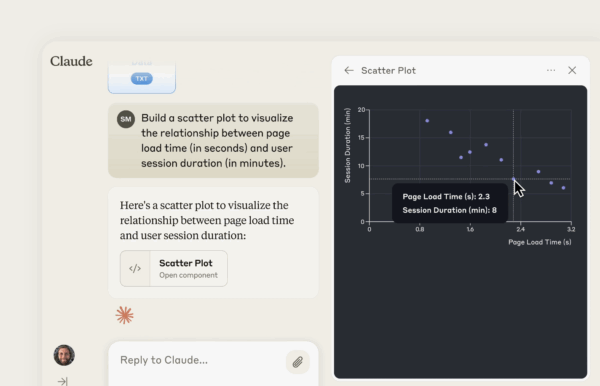
Claude comes with a free option and several paid options. The free version gives users access to Claude’s chat and allows them to generate code, create content and analyze text and images. When it comes to their paid plans, there are options for individuals looking to integrate Claude into their terminal or workspace. But also options for organizations or developers or businesses looking to get access to the API. I would recommend having a look at the options to see what would be a good fit for you.
12. NotebookLM
NotebookLM is an AI-powered note-taking and research tool developed by Google. It was designed to help users interact with their own documents using generative AI. It allows you to upload sources such as PDFs, Google Docs, YouTube-video’s or audio files, and then ask questions or generate summaries based on that content. Unlike other AI tools, NotebookLM uses the user’s uploaded material, which makes its responses more contextually accurate and personalized.
One of the standout features of NotebookLM is its ability to create structured summaries, highlight key themes, and generate helpful outlines based on the uploaded sources. You can interact with the model by asking detailed questions, getting explanations of terms, or generating content like FAQs or briefing docs. This productivity tool blends note-taking, research, and brainstorming in one interface.
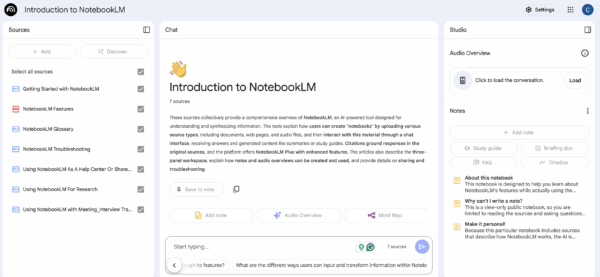
As of now, Google offers NotebookLM for free. The tool is available to users in supported regions through their Google accounts and is still positioned as an experimental product.
Read more: Generative AI and SEO: Revolutionizing content creation »
The post 12 AI tools that will elevate your SEO game appeared first on Yoast.

Your insights on balancing AI assistance with human input resonate deeply. I’ve found that while AI tools can drastically speed up the research and analysis process, they often miss the subtleties that make content engaging and authentic. For instance, I recently used an AI tool for keyword research, and while it generated a comprehensive list, it lacked the contextual understanding necessary to tailor these keywords to my specific audience’s interests.